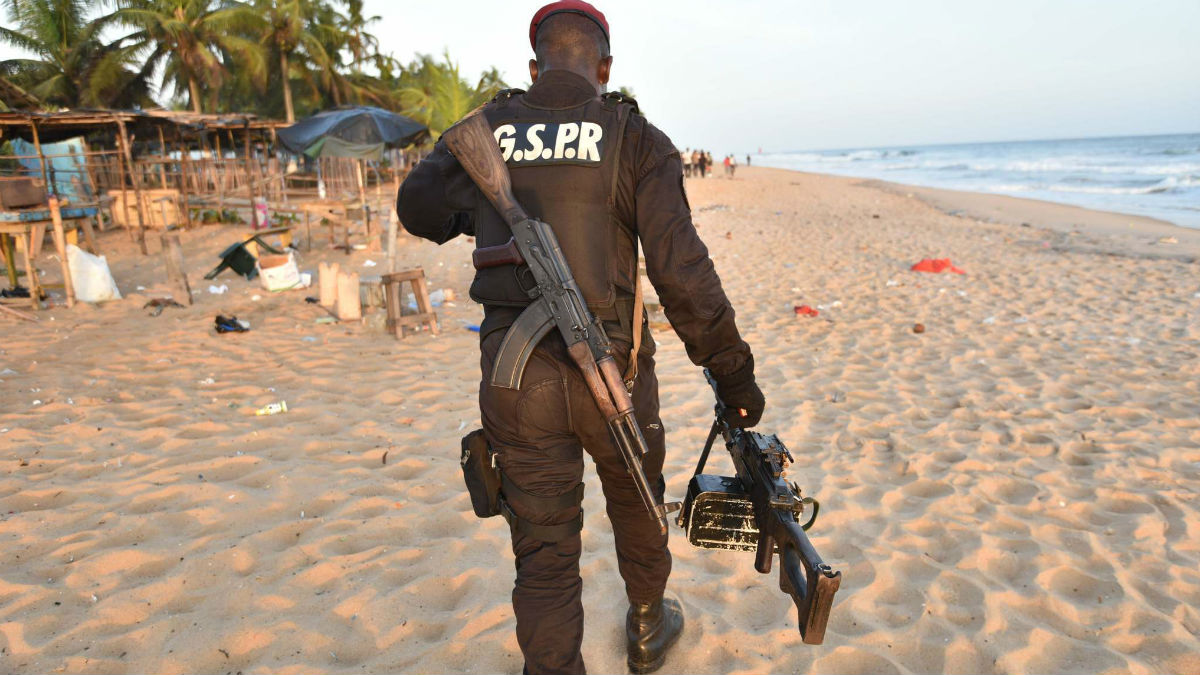Al-Qaeda claims responsibility for Ivory Coast attack
At least 16 people killed after 'calm' gunmen open fire in popular Grand Bassam beach resort

A free daily email with the biggest news stories of the day – and the best features from TheWeek.com
You are now subscribed
Your newsletter sign-up was successful
Gunmen who attacked a popular Ivory Coast beach resort on Sunday were working on behalf of Al-Qaeda, a faction of the terror group has claimed.
Al-Qaeda in the Islamic Maghreb (AQIM) said it was responsible for the carnage at Grand Bassam, on the south-east coast. At least 16 people were killed, including four Westerners and two soldiers, authorities say.
Witnesses described how gunmen wearing balaclavas shouted "Allahu akbar" as they "calmly" walked along the waterfront on Sunday lunchtime, firing on beachgoers with AK-47 rifles.
The Week
Escape your echo chamber. Get the facts behind the news, plus analysis from multiple perspectives.

Sign up for The Week's Free Newsletters
From our morning news briefing to a weekly Good News Newsletter, get the best of The Week delivered directly to your inbox.
From our morning news briefing to a weekly Good News Newsletter, get the best of The Week delivered directly to your inbox.
Yves Losseau, a Belgian national who was on the beach, told Belgian national radio how he and others attempted to take refuge in a hotel. "I saw one of the attackers approach the hotel garden and I saw him shoot dead a European woman," he said. "After the attacker shot the woman, he walked away calmly."
Ivorian authorities say security forces have "neutralised" six armed men in connection with the attack. A final death tally has not been confirmed and the UK Foreign Office is working to establish if any British nationals were among the victims.
For more than 30 years under president Felix Houphouet-Boigny, Ivory Coast was seen as a model example of a prosperous and stable African nation. Since his death in 1993, political and religious tensions have risen between the majority Christian south and Muslim rebels in the north, culminating in a five-year civil war in 2002 and another conflict in 2010.
This weekend's attack suggests attempts to keep domestic Islamic militants pinned in the north may have failed. "They were sub-Saharan Africans," a local trader told The Guardian. "Even though they wore balaclavas, everyone saw they had brown hands."
A free daily email with the biggest news stories of the day – and the best features from TheWeek.com
AQIM, which originated in Algeria but has since spread into sub-Saharan Africa, has previously claimed responsibility for the November 2015 attacks on hotels in neighbouring Mali and this January's killings in Burkina Faso.
-
 The Olympic timekeepers keeping the Games on track
The Olympic timekeepers keeping the Games on trackUnder the Radar Swiss watchmaking giant Omega has been at the finish line of every Olympic Games for nearly 100 years
-
 Will increasing tensions with Iran boil over into war?
Will increasing tensions with Iran boil over into war?Today’s Big Question President Donald Trump has recently been threatening the country
-
 Corruption: The spy sheikh and the president
Corruption: The spy sheikh and the presidentFeature Trump is at the center of another scandal
-
 Epstein files topple law CEO, roil UK government
Epstein files topple law CEO, roil UK governmentSpeed Read Peter Mandelson, Britain’s former ambassador to the US, is caught up in the scandal
-
 Iran and US prepare to meet after skirmishes
Iran and US prepare to meet after skirmishesSpeed Read The incident comes amid heightened tensions in the Middle East
-
 Israel retrieves final hostage’s body from Gaza
Israel retrieves final hostage’s body from GazaSpeed Read The 24-year-old police officer was killed during the initial Hamas attack
-
 China’s Xi targets top general in growing purge
China’s Xi targets top general in growing purgeSpeed Read Zhang Youxia is being investigated over ‘grave violations’ of the law
-
 Panama and Canada are negotiating over a crucial copper mine
Panama and Canada are negotiating over a crucial copper mineIn the Spotlight Panama is set to make a final decision on the mine this summer
-
 Why Greenland’s natural resources are nearly impossible to mine
Why Greenland’s natural resources are nearly impossible to mineThe Explainer The country’s natural landscape makes the task extremely difficult
-
 Iran cuts internet as protests escalate
Iran cuts internet as protests escalateSpeed Reada Government buildings across the country have been set on fire
-
 US nabs ‘shadow’ tanker claimed by Russia
US nabs ‘shadow’ tanker claimed by RussiaSpeed Read The ship was one of two vessels seized by the US military